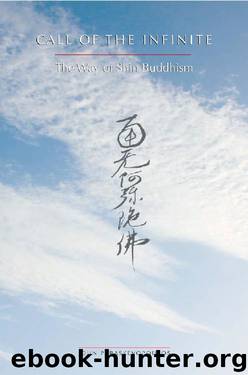Call of the Infinite: The Way of Shin Buddhism by John Paraskevopoulos

Author:John Paraskevopoulos [Paraskevopoulos, John]
Language: eng
Format: epub
Tags: Philosophy, Buddhist
ISBN: 9781621382454
Google: uy86MQAACAAJ
Publisher: Angelico Press
Published: 2017-01-25T23:00:00+00:00
We should not express outwardly signs of wisdom, goodness or diligence, for inwardly we are possessed of falsity. We are filled with all manner of greed, anger, perversity, deceit, wickedness and cunning, and it is difficult to put an end to our evil nature. In this, we are like poisonous snakes or scorpions.
—Shan-tao
Such a confronting insight can only be obtained through seeing ourselves, as we really are, through the eyes of Amida Buddha. Even those who possess some measure of genuine self-awareness, despite renouncing any kind of religious adherence, also reflect—in their own way—Amida’s working which seeks to bring all beings to a knowledge of their false self and its perils.
How, then, is shinjin to be realised? How do we encounter the light that represents the wisdom of Amida Buddha? What are we required to do? Before we proceed to answer these questions, we need to examine the nature of practice. In Shin Buddhism, the notion of practice is tied up with its view of the mundane self. A problem arises when we try to overcome the limitations of the self-centred ego through practices that rely on this very self ‘doing something’ in order to escape its entrapment. A well-known metaphor is the idea of trying to pick yourself up by your own boot straps.
Shinran’s great insight was that we cannot conquer the self by the self. Some kind of external agency is required: (a) to help us shed light on our ego as it really is in all its petty and baneful guises; and (b) to enable us to subdue the small ‘self’ with a view to realising the Great Self by awakening to Amida’s light. Our ego cannot possibly accomplish this by relying on its own meagre resources without reaching an impasse. Furthermore, it is extremely reluctant to do so; it cannot and will not execute its own death warrant.
Clearly, a balanced ego and a healthy self-identity is essential to functioning properly in the world. However, it would be true to say that, generally speaking, our sense of self has a tendency to be closed in, separate and remote from others.
In Mahayana thought, all things are interconnected as they comprise different aspects of the one Dharma-Body. Therefore, the mistaken belief that what we perceive as external reality lies completely outside ourselves can be damaging to our psyche. The solution, according to Shinran, was to yield that to which we are most attached—our very self—to another power (tariki in Japanese, meaning ‘Power of the Other’), this being Amida Buddha.
When we surrender ourselves in this way, we begin to experience intense relief from our tragic spiritual desolation and the crushing wretchedness that we have carried with us for so long. This then compels us, naturally, to want to reject any practices that are tainted by the ineffectual ‘power of the self’ (jiriki)—we come to see them as impotent efforts based on the tenuous reality of the ego, which can only lead us down blind alleys.
Such practices include meditation when it
Download
This site does not store any files on its server. We only index and link to content provided by other sites. Please contact the content providers to delete copyright contents if any and email us, we'll remove relevant links or contents immediately.
The Way of Zen by Alan W. Watts(6600)
Ego Is the Enemy by Ryan Holiday(5413)
The Art of Happiness by The Dalai Lama(4125)
The Book of Joy by Dalai Lama(3976)
Why Buddhism is True by Robert Wright(3446)
Spark Joy by Marie Kondo(3298)
Shift into Freedom by Loch Kelly(3193)
Happiness by Matthieu Ricard(3040)
A Monk's Guide to a Clean House and Mind by Shoukei Matsumoto(2902)
The Lost Art of Good Conversation by Sakyong Mipham(2649)
The Meaning of the Library by unknow(2564)
The Unfettered Mind: Writings from a Zen Master to a Master Swordsman by Takuan Soho(2305)
The Third Eye by T. Lobsang Rampa(2257)
Anthology by T J(2206)
Red Shambhala by Andrei Znamenski(2193)
The Diamond Cutter by Geshe Michael Roach(2058)
Thoughts Without A Thinker: Psychotherapy from a Buddhist Perspective by Epstein Mark(2011)
Twilight of Idols and Anti-Christ by Friedrich Nietzsche(1891)
Advice Not Given by Mark Epstein(1878)
